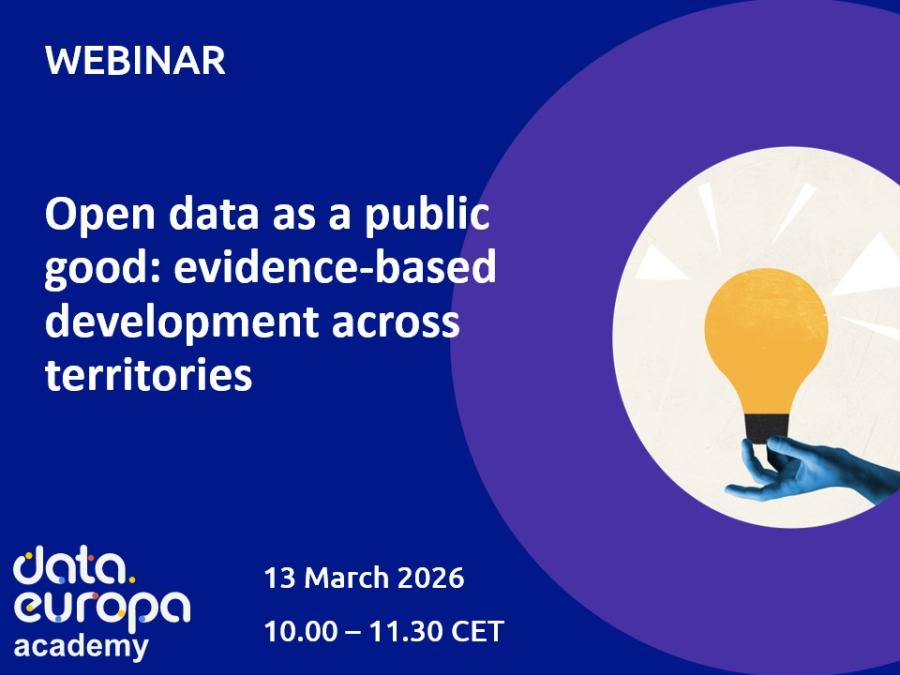Ιρλανδία
Ιστολόγια από: Ιρλανδία
Skip results of view Country Insight Blogs

Ireland Case Study
The Irish Open Data Unit comprises of a small team of 4 people within the Ministry of Public Expenditure and Reform with responsibility for Ireland’s Open Data Initiative. Our Open Data Initiative in Ireland has gone from strength to strength since it was instigated in 2015. In 2019, it was confirmed that Ireland is continuing to lead the way in Europe for Open Data having been ranked top of the European Commission’s Open Data Maturity survey for the third consecutive year. Separately, the OECD 2019 ‘ OurData Index on Open Government Data’, placed Ireland 3rd behind Korea and France

Use cases in: Ιρλανδία
Skip results of view Use cases
Failte Maps is a product of the Irish National Tourism Development Authority and enables users to view sites relevant to tourist on a map of the area. Those sites include famous historical landmarks, tourist attractions and activities, currently available accommodation, and transportation related sites such as car rentals and taxi services
The Ocean Energy Portal aims to contribute to green economy goals by offering information on the sustainable development of offshore renewable energy resources. The website encourages the increase of indigenous production of renewables so that the supply of energy can be secured for future generations. The available information touches on one of six domains, being: marine data, maps, tools, funding, energy site assessment, management and development.
Failte Maps is a product of the Irish National Tourism Development Authority and enables users to view sites relevant to tourist on a map of the area. Those sites include famous historical landmarks, tourist attractions and activities, currently available accommodation, and transportation related sites such as car rentals and taxi services
Εκθέσεις σε: Ιρλανδία
Skip results of view Τεκμηρίωση

Study
Data sharing as a service: will data services remove intellectual property rights from the picture, and at what cost?

Λήψη
Εκδηλώσεις ανοικτών δεδομένων σε: Ιρλανδία

Do you want to explore how open data can support better governance in rural areas and help policymakers respond to local needs beyond the city? Join us for the upcoming data.europa academy...
Προς το παρόν δεν υπάρχουν προσεχείς εκδηλώσεις
Open Data News in: Ιρλανδία
Skip results of view Τελευταία νέα για τα Ανοιχτά Δεδομένα





On Friday 16 February 2024, from 10.00 to 11.30 CET, the data.europa academy hosted the webinar ‘Open data maturity 2023: best practices across Europe‘ which highlighted Slovakia's and Serbia's accomplishments in the field of open data. With nearly 600 registrants, the event underscored the growing interest and commitment to open data across the continent. An expert from data.europa.eu initiated the session by presenting the ODM results , setting the stage for in-depth country analyses. Following this introduction, the narrative shifted to Serbia . In just two years, Serbia demonstrated

On 1 March 2024 , from 10:00 to 11:00 CET , our webinar on "New b usiness m odels for d ata- d riven s ervices" is set to provide fresh insights into the utilisation of open data. Th e event, building on the data.europa.eu discussion paper , aims to explore how public sector information, when made available as open data, can be purposefully re-used to creat e value for both public and private sectors . In recent years, the focus on open data has shifted towards understanding and meeting end-user needs. Th e webinar will examine the potential of open data in Europe, exploring how it can drive

This year marks the fifth anniversary of RescEU, an initiative by the European Commission that has strengthened disaster response mechanisms across Europe. Established to extend the EU Civil Protection Mechanism, RescEU embodies a deep commitment to protecting citizens from diverse disasters and managing emerging risks effectively. Since its launch in 2019, RescEU has served as a robust reserve of European capacities, fully funded by the EU. This includes a fleet of firefighting aircraft, medical evacuation planes, and critical medical supplies and field hospitals, ready to tackle health

The International Day of Women and Girls in Science, celebrated on 11 February, highlights the critical role women and girls play in science and technology. This year, the focus is on "Women in Science Leadership: A New Era for Sustainability," recognising their contribution to tackling global challenges such as health and climate change. The diversity in research, brought by women, brings fresh perspectives, talent, and creativity, essential for sustainable development. Despite progress in higher education, women continue to be underrepresented in Science, Technology, Engineering, and



